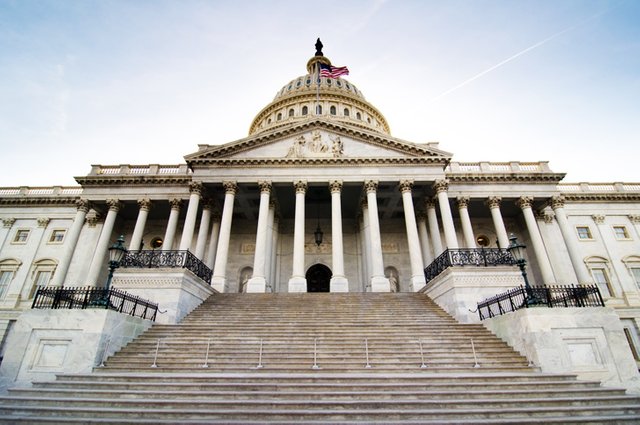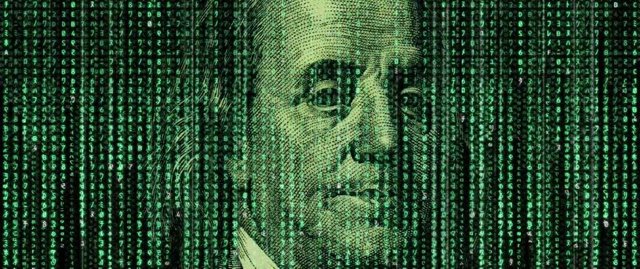Cryptocurrency Discussion: Can bitcoin still thrive if governments introduce their own digital coins?

Govcoin is coming.
To piggy back a little off of what I wrote yesterday, I'd like to continue to dive into this topic because I feel it is fundamental in determining how much value bitcoin and others might have in the future.
What I wrote yesterday can be seen here: https://steemit.com/bitcoin/@jrcornel/welcome-to-the-dark-side-jamie-dimon
Yesterday I mentioned how different countries around the world are currently studying blockchain technology and they are trying to figure out how to create digitized versions of their fiat money, likely running on a blockchain of some sort.
For example; China, Russia, Japan, and even the United States are all rumored to be testing out ways to implement their current monetary system into digital form.
Digital dollars, digital rubles, digital won etc etc.
Not only are they testing them, but rumors are circulating that they may be ready to launch such money in the next 12-18 months.
Which really isn't that long in the grand scheme of things.

That begs the question, where does bitcoin go if all these countries decide to launch their own digital currency?
There are several possibilities in my mind:
For one, you could have the case where each country requires taxes to be paid in their native currency, plus they also have stabilization measures attached to their currency to keep it's value roughly pegged to a specific level.
Which in turn would help keep much of the volatility out, and make it a more attractive means of exchange in general for people and businesses alike.
As you might imagine, these probably wouldn't be all that beneficial to the price of bitcoin, especially that last part where businesses are offered another means of payment that has all the current advantages of bitcoin but without all the volatility.
The other possibility would be one where people are drawn to bitcoin etc. because it is not controlled by a central authority, because it is not controlled by any one entity, and because it is truly decentralized money.
If that is indeed the case, then regardless of the laws set to favor the government backed digital money, you would still see a large segment own and transact in bitcoin.
Which, this scenario would obviously provide a much better outlook for the price of bitcoin in the future.

Which scenario is more likely?
This one is likely an opinion based answer depending on where you stand on that debate...
Which is why I'd like to open it up to the community and hear your thoughts on what you think is coming and how that will effect the current crypto markets?
For me personally, I fear that when state backed digital money starts being unveiled that will pull a lot of the money out of bitcoin and others, however, I would love to be proven wrong.
My reasoning is that I think a lot of the current money in bitcoin is in it because they think bitcoin will eventually be used by many businesses around the world. I just have a hard time believing it will have any real utility compared to something like a digital dollar.
If you take the possible utility aspect of it out, there isn't all that much left, in my opinion.
In the end it all comes down to how strong the desire for a decentralized monetary system really is.
If people are buying these things because they want a different form of money, then they can gain some major traction.
However, if people are just buying them to make a quick buck, well then, the ending to that kind of scenario may not be so pretty.
What does the community say, what do state backed digital currencies mean for the future of bitcoin?
Stay informed my friends.
Image Sources:
https://inhabitat.com/united-states-government-shutdown-cuts-down-on-emissions/
http://www.bbc.com/news/technology-36785872
Follow me: @jrcornel
Government money is already digital. Only a small fraction of the total supply is paper currency, so what would change?
It is unlikely that they would relinquish control of the money supply. If anything they can make it mandatory to use the digital version of fiat money to tighten their controls of the population.
Actual P2P currencies are the antithesis of centralized ones. The market proposition of crypto's will still remain. If digital fiat is made more efficient then the only cryptocurrencies than can compete will be the ones that can scale...and those are not POW coins.
Great comment. I tend to agree. That being the case, what coins that currently exist might survive in such an environment, in your opinion?
Considering that this is the most used blockchain STEEM has a shot in the form of Steem Dollars if somehow it can return to the USD peg (stability is important for merchant adoption). Maybe Bitshares with it's smart coins can gain some real leverage (but the fee model is kind of a roadblock).
I must admit that I am biased to DPOS coins. EOS doesn't exist yet but maybe we could include it (or something built on top of it).
Railblocks and IOTA look promising. I used to be a big fan of DASH but the fee & masternode model are an incentive for holding instead of using it as a currency.
Good idea
I think such a scenario would be a gut-check for many of the core supporters of cryptocurrencies.
I think the majority of crypto investors, or at least investment money, could care less about if it is a government coin or a decentralized coin. Do you think average Korean or Japanese crypto investor cares if it's fedcoin or Monero, two coins with very different philosophies? Unfortunately, probably not. Most are in it for the money, and will be more than happy to jump on the bandwagon of a new gov. coin as long it promises returns over the short term. I fear this as well.
Indeed, I've sold most of my ripple for this reason, and will eventually dump all of them during the next upward trajectory. See, I'm a bit guilty of this myself...nevertheless, I no longer want to support projects that will lead to government/corporate oversight and interference.
Fedcoin is coming at some point, but I don't see it for a while. It will be funny to see Maduro's petrol project go up in flames though.
I agree on the Petro currency. It might have a chance if it was backed by oil or whatever other physical asset they plan on using, that was already extracted from the ground. You'd still have to trust the Venezuelan government that the oil they say is backing the coin is actually there, but it'd be improvement. One of the major problems with it in it's current form, is that it is backed by oil that is still in the ground. The owner of the Petro coin has to rely on the government and it's employees to extract the oil, and that is far from a sure thing in a country that is on the brink of bankruptcy and in the midst of hyperinflation.
I agree. 90% of current investor bought in because prices were going up and they thought they could make money. Nothing wrong with that, but as you suggested, they won’t care what coin it is. Most people have no idea of the use case of what they are buying (as most coins don’t seem to have one)!
I should add that the average crypto investor in the states or Europe probably would not care either, though we may tend to take a more decentralized or freedom based approach.
Lol, so that means Govcoin will be the next pump-and-dump coin.
But governments can’t manipulate currencies because democracy.
For example, look at the United States.
The United States government has absolutely not, even a single time, in any way shape or form, in any manner, ever, manipulated the U.S. dollar.
Because democracy.
are you kidding?
Fortunately no, I’m not kidding.
Look at how the military dictatorship of North Korea manipulated their currency in order to artificially pump their corrupt housing program, the “Financial Assistance for the New National Interest and Existing Market and Aftermarket Economy,” (known by North Koreans as “Fannie Mae”), which gave kickbacks to the ruling caste in North Korea.
Well when that caused the North Korean housing bubble to burst in 2008, further manipulation of the North Korean money supply by their totalitarian regime allowed for the housing bust to actually cause a years long, full-blown recession throughout all of North Korea that is still hurting its citizens to this very day.
Nothing even remotely similar to that in any way could ever happen in the United States.
Because democracy.
LOL!
It's possible that there are some investors who will ONLY buy into cryptocurrencies that are backed by governments because they fear the risks of decentralized coins.
A govcoin wouldn't be a good store of value, it can be inflated any time, just like the underlying govcurrency.
Governments/central banks would be those buyers, along with institutional investors.
A gov-backed cryptocurrency will not be any different than the current fiat system, where printing is rampant and monetary policy is decided by a group of men who think they know what is best for the economy.
If you're attempting to keep volatility out, you're interfering with the free market. Central planning does not work.
Government cryptos will have to compete with the likes of bitcoin and ethereum on the international stage, and I hold the opinion that they will lose!
I just got done listening to some CEOs talk about how they love the idea of digital money, and cheaper transfers, however, they hate the volatility and for that reason btc (and many others) aren't an option. However, they said if the government were to launch something with all the benefits of current cryptocurrencies but without the big negative of massive volatility, they would adopt it in a heart beat. That seemed to be the consensus among trillions of corporate dollars...
A nice and current actuele theme that you bring up. In my opinion it is a matter of time before such a govcoin is introduced. In fact, Venezuela recently announced that it. That country faces hyperinflation. They will cover the value through oil stocks. I think it is even more interesting what our society as a whole in general will regard as recognized. Monetary power is on the decline and therefore governments will be inclined to seize the digital transformation to organize it according to their own needs. Of course this will not go without a struggle and I am in favor of the decentralized character. We will see what the future will bring us. In the meanwhile let us enjoy this free market.
I don't think the govcoin is even 5 years out. Government is slow by design (for good or bad). Cryptocurrencies will have there opportunity to succeed.
Yes I think they can compete. If the technology is better and the benefits are better, there's no reason not to use it. There will always be a market for privacy coins like Monero so I don't think Govcoins can completely replace current cryptocurrencies but there is certainly a market for them.
From my point of view, Bitcoin is not here to stay. The blockchain technology will get better and better ways to counter scalability issues will come up.
Will Bitcoin be able to cope with the rapid changes is up for debate.
Who remembers the first email client? Now we only know Gmail and a few new.
To get to your topic, I tried explaining Bitcoin to many people but failed to rise the interest of more than 10%.
People prefer government money as it is safer. The common man is not about hiding taxes. It is about getting money in the first place.
If government provide digital money, 80% will definitely use it out of constraints of the society. People don't want the hassle and the complexity of technology.
The most simple, valid, not corrupt and regularised will what the common man will take.
I believe that those who own crypto right now are those who know and understand the game changing aspects. The others are mere spectators watching to tell us:
"I told you so! Don't invest in crypto and now you have nothing."
I'm going to come at this bass-ackwards and say that Bitcoin sucks as a currency. It's too cumbersome, too slow and FAR too volatile. It's an investment, not a real medium of exchange.
From where I am sitting, the greatest challenge free market cryptos face is their volatility, which is keeping them from being useful and easy to adopt as the medium of exchange for buying things from my web site.
A super minor example: I was thrilled to be one of the earliest users of Steemit's @steembay initiative... but what happened? Between the time of my putting something up for sale (in SBD) and the auction ending, the VALUE of my item went from a tad over $3 to $33. From a commercial standpoint, that's not workable in the real world.
The thing about gov-coins is that they have the potential to offer that stability. And that is a threat to cryptos as they exist today.
My thoughts as well. So, what happens to the current cryptos when govcoins enter the fold?
I think many that promise widespread adoption as an actual currency will fall to the wayside, as their market is taken over by the govcoins. Some will be kept alive by speculative investors, as well as principled investors that choose decentralized coins.
I'm sorry, I'm not a financial expert just a regular person but I have to ask, "stability" in relationship to what? because last time I checked the USD is only an illusion, is like the story of the frogs being cooked slowly, let me illustrate, EVERYTHING! from rent, food, education, medicine,..etc. keeps going up in price, how is that not volatile? slow motion perhaps, but nevertheless volatile, I think people who have no chance of survival in the old model, will rather take a chance on the new.
Every new invention is a volatile investment in the beginning until it reaches a price correction, isn't that how it works? like I said I'm only sharing the view from the bottom of the pyramid
Unfortunately, in today's market environment, I think price stability for cryptos would be double-edged sword. It would give them more legitimacy as a future currency that would guarantee price stability. However, at this point in time, the majority of the money that moves into cryptos is investment money looking for a high return on a speculative investment. If that chance of high returns (that we have seen come to fruition thus far) were to disappear, many investors would move on to the next asset or crypto that is still has high volatility.
I think that much like we see with current fiat currency that if it is centralized by the government , I think people will not trust it - normal everyday consumers will likely adapt to it with no problem - but other countries may be less than impressed with centralized digital money - especially when you consider that our current ability to print money devalues it every year and other countries re taking notice and questioning the USD ability to remain the world reserve capital. China is trying to convince OPEC to accept YUAN instead of USD - if we have digital assets - there may be even less trust in the financial system and we could lose the position we are very tightly hanging onto right now -
that being said - I suspect that some of the ways they could maintain control would be to make it illegal to trade on anything other than a government exchange - they can even go so far as to pronounce all non government crypto to be considered counterfit money and illegal to trade -they could work with internet providers to block other exchanges - ther are many things they can do to squash the system - it may not affect demand in the long run but it could set it back several decades if big brother decides that this is their pool and no one else is can play in it ... look at what just happened with S. Korea...
I agree. At this point in time, I don't think Bitcoin or other cryptos represent a significant threat to the dollar or other fiats, simply because they have such a small market share. They just aren't used much as a currency, and are primarily a speculative investment right now. But as they integrate into the economy, this regulation or prohibition is a real threat many individuals refuse to acknowledge. With that being said, I do think that there are advancements in technology on the decentralized side of things that have and will be created in the future that will allow those that choose, to still use cryptos. But most of the speculative money will have left, unfortunately, and they will go back to what Bitcoin was a few years ago. Something techie libertarians bought, and something the dark web used.
Worst case scenario, of course.
Maybe the question should be: can governments still control money when decentralized cryptos take over? I personally think we will get a denationalization of the currencies.